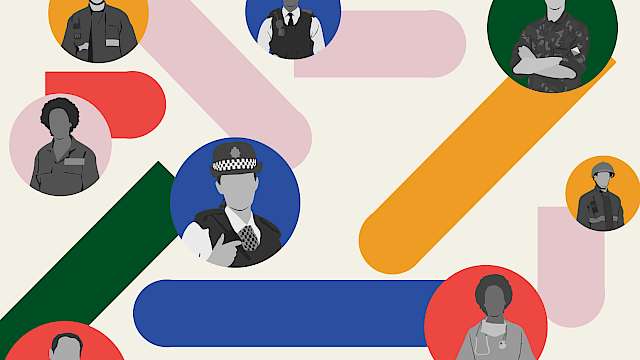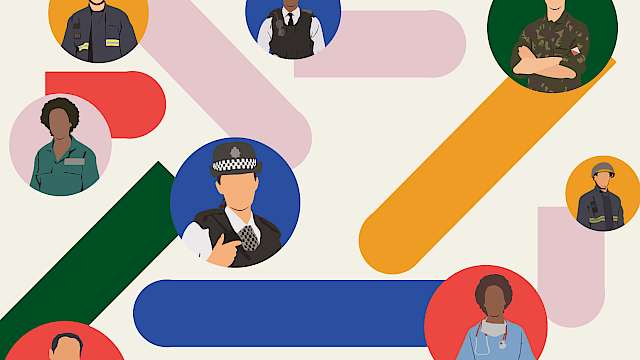Nicola Power
CREST Outputs
Projects
Articles
Academic Publications
Communication and coordination across event phases: A multi-team system emergency response
This paper explores how multi-agency response teams communicate and coordinate in different phases of a simulated terrorist incident. Procedural guidelines state that responders should coordinate their response to a major emergency across two phases: ‘response’ (when the incident is ongoing) and ‘recovery’ (when the threat has subsided, but the legacy of the incident is ongoing). However, no research has examined whether these phases map to the behaviours of responders in situ. To address this, we used measures of communication and coordination to examine how behaviours evolved during a simulated terrorist incident in the United Kingdom. We grounded our approach within the theoretical literature on multi-team systems. It was found that the current response/recovery classification does not fit the nuanced context of an emergency. Instead, a three-phase structure of ‘response/resolve/recovery’ is more reflective of behaviour. It was also found that coordination between agencies improved when communication networks became less centralized. This suggests that collaborative working in multi-team systems may be improved by adopting decentralized communication networks.
(From the journal abstract)
Brown, O., Power, N. and Conchie, S.M. (2021), Communication and coordination across event phases: A multi-team system emergency response. J Occup Organ Psychol.
https://doi.org/10.1111/joop.12349Immersive simulations with extreme teams
Extreme teams (ETs) work in challenging, high pressured contexts, where poor performance can have severe consequences. These teams must coordinate their skill sets, align their goals, and develop shared awareness, all under stressful conditions. How best to research these teams poses unique challenges as researchers seek to provide applied recommendations while conducting rigorous research to test how teamwork models work in practice. In this article, we identify immersive simulations as one solution to this, outlining their advantages over existing methodologies and suggesting how researchers can best make use of recent advances in technology and analytical techniques when designing simulation studies. We conclude that immersive simulations are key to ensuring ecological validity and empirically reliable research with ETs.
(From the journal abstract)
Brown, O., Power, N., & Conchie, S. M. (2020). Immersive simulations with extreme teams. Organizational Psychology Review, 10(3–4), 115–135.
https://doi.org/10.1177/2041386620926037The psychology of interoperability: A systematic review of joint working between the UK emergency services
Emergency responding requires effective interoperability, whereby different emergency teams combine efforts and expertise to contain and reduce the impact of an emergency. Within the United Kingdom, the capacity for the Emergency Services to be interoperable has been criticized by public enquiries. This systematic review had three goals to: (i) define interoperability; (ii) identify the structural principles that underpin interoperability and (iii) identify the psychological principles that outline how interoperability can be achieved. A PRISMA framework was used to identify 137 articles, including 94 articles from the systematic review, 15 articles from grey literature and 28 articles based on author expertise. We identified two structural principles of interoperability: (i) being able to communicate and exchange information effectively; and (ii) having a decentralized and flexible team network. We identified three psychological principles that informed how interoperability might be embedded in the team: (i) establishing trust between team members; (ii) developing secure team identities and (iii) building cohesive goals. We defined interoperability as a shared system of technology and teamwork built upon trust, identification, goals, communication and flexibility. Regular psychologically immersive training that targets these psychological principles will help to embed interoperability into the social fabric of multi-team systems operating in high-reliability organizations.
(From the journal abstract)
Power, N., Alcock, J., Philpot, R., & Levine, M. (2023). The psychology of interoperability: A systematic review of joint working between the UK emergency services. Journal of Occupational and Organizational Psychology, 00, 1–20. https://doi.org/10.1111/joop.12469
https://bpspsychub.onlinelibrary.wiley.com/doi/full/10.1111/joop.12469
Projects
Articles
Academic Publications
Communication and coordination across event phases: A multi-team system emergency response
This paper explores how multi-agency response teams communicate and coordinate in different phases of a simulated terrorist incident. Procedural guidelines state that responders should coordinate their response to a major emergency across two phases: ‘response’ (when the incident is ongoing) and ‘recovery’ (when the threat has subsided, but the legacy of the incident is ongoing). However, no research has examined whether these phases map to the behaviours of responders in situ. To address this, we used measures of communication and coordination to examine how behaviours evolved during a simulated terrorist incident in the United Kingdom. We grounded our approach within the theoretical literature on multi-team systems. It was found that the current response/recovery classification does not fit the nuanced context of an emergency. Instead, a three-phase structure of ‘response/resolve/recovery’ is more reflective of behaviour. It was also found that coordination between agencies improved when communication networks became less centralized. This suggests that collaborative working in multi-team systems may be improved by adopting decentralized communication networks.
(From the journal abstract)
Brown, O., Power, N. and Conchie, S.M. (2021), Communication and coordination across event phases: A multi-team system emergency response. J Occup Organ Psychol.
Immersive simulations with extreme teams
Extreme teams (ETs) work in challenging, high pressured contexts, where poor performance can have severe consequences. These teams must coordinate their skill sets, align their goals, and develop shared awareness, all under stressful conditions. How best to research these teams poses unique challenges as researchers seek to provide applied recommendations while conducting rigorous research to test how teamwork models work in practice. In this article, we identify immersive simulations as one solution to this, outlining their advantages over existing methodologies and suggesting how researchers can best make use of recent advances in technology and analytical techniques when designing simulation studies. We conclude that immersive simulations are key to ensuring ecological validity and empirically reliable research with ETs.
(From the journal abstract)
Brown, O., Power, N., & Conchie, S. M. (2020). Immersive simulations with extreme teams. Organizational Psychology Review, 10(3–4), 115–135.
The psychology of interoperability: A systematic review of joint working between the UK emergency services
Emergency responding requires effective interoperability, whereby different emergency teams combine efforts and expertise to contain and reduce the impact of an emergency. Within the United Kingdom, the capacity for the Emergency Services to be interoperable has been criticized by public enquiries. This systematic review had three goals to: (i) define interoperability; (ii) identify the structural principles that underpin interoperability and (iii) identify the psychological principles that outline how interoperability can be achieved. A PRISMA framework was used to identify 137 articles, including 94 articles from the systematic review, 15 articles from grey literature and 28 articles based on author expertise. We identified two structural principles of interoperability: (i) being able to communicate and exchange information effectively; and (ii) having a decentralized and flexible team network. We identified three psychological principles that informed how interoperability might be embedded in the team: (i) establishing trust between team members; (ii) developing secure team identities and (iii) building cohesive goals. We defined interoperability as a shared system of technology and teamwork built upon trust, identification, goals, communication and flexibility. Regular psychologically immersive training that targets these psychological principles will help to embed interoperability into the social fabric of multi-team systems operating in high-reliability organizations.
(From the journal abstract)
Power, N., Alcock, J., Philpot, R., & Levine, M. (2023). The psychology of interoperability: A systematic review of joint working between the UK emergency services. Journal of Occupational and Organizational Psychology, 00, 1–20. https://doi.org/10.1111/joop.12469











